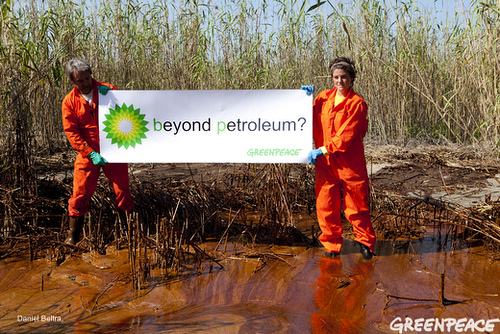I am very cautious about giving investment advice and downright reluctant to just pile onto the media frenzy attacking BP for its blunders in the Gulf of Mexico. That said, I feel compelled to warn America about the greater disaster that looms ahead for anyone who owns BP stock or anyone east of the Mississippi River who breathes.
President Obama has criticized BP for paying dividends to shareholders before a full accounting of damages for the Deepwater Horizon disaster. His Attorney General may bring criminal charges. Credit Suisse reports that clean-up costs may reach $23 billion and that legal claims could top another $14 billion. Even BP’s CEO admits “it is impossible to predict the longer-term cost of environmental remediation, claims and litigation, but they will be sizable.”
Despite these massive uncertainties, last week 10 of the 14 leading analysts who follow the company have “buy” ratings on BP stock. They cite 18 billion barrels of proven reserves held by the company in dozens of countries and over $4 billion in profits in the last quarter of 2009 alone. One of the experts recommending “buy” said the reduction in BP’s market value since the spill began “implies gross, pre-tax environmental claims and costs to be in the $80 billion to $110 billion range, which we believe to be unrealistically high.”
Although politicians, lawyers, and experts on all sides may differ, not one of them has grasped the cost that may yet be the biggest liability and which may dwarf any assets that BP can ever muster. They have all failed to understand the potential damage claims that are yet to come from millions of people who live well beyond the immediate impact zone in the Gulf states. Lives and livelihoods will be threatened in two fundamental ways that will give those who are hurt the legal and financial standing to make claims that may spell the end of BP altogether.
First, the Loop Current will move oil from the Gulf around the Florida peninsula and spread it up the east coast. As the Gulfstream current moves it northward and summer storms drive it onshore, BP’s oil is very likely to foul beaches along the entire eastern seaboard and damage the tourist, fishing, and other industries in the region, just as it has already done in the Gulf. Because oil can be tested and its origins confirmed, cleanup costs and financial damage claims against BP will spread to quickly, perhaps as far north as Canada.
Second, and far more insidious, when 2010 hurricanes begin to vent warm waters of the Gulf and Atlantic, everyone in the eastern half of the US will be breathing BP’s oil and probably the toxic dispersants used in the futile effort to tame the original spill. Researchers have discovered that much of the oil broke down into tiny droplets that hover in giant plumes at various depths, not just the sheens that are visible at the surface. The oil is now mixed with chemical dispersants that created these droplets in the first place – – all waiting to be aspirated when the storms churn the seas and send wind-driven rain throughout the mid-west and eastern US. This toxic stew will make the acid rain of the 1970s seem benign in comparison and, when millions of Americans breathe BP’s witches brew, wipe it from their cars and homes, and find it contaminating food and water supplies, there won’t be enough lawyers – – or oil profits – – to handle the claims.
As a former regulator who has closely studied the impacts of petroleum-related air pollution and described them in my last book “Lives Per Gallon: The True Cost of Our Oil Addiction”, I am truly fearful for my fellow Americans who live in the path of this coming plague. As someone with a few dollars in retirement account, I will make sure my mutual fund does not include any BP stock and will advise anyone I know to sell their shares before it’s too late. Beyond that, the best we can do is hope for a mild hurricane season – – and hold our breath when it comes.


